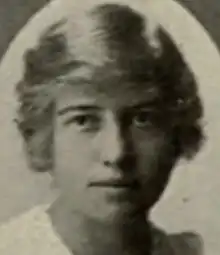Dorothe Rieber Joralemon | |
|---|---|
 Dorothy Rieber, from the 1915 yearbook of the University of California | |
| Born | March 19, 1893 San Francisco, California |
| Died | March 22, 1987 Berkeley, California |
| Occupation(s) | Artist, writer |
Dorothy Rieber Joralemon (March 19, 1893 – March 22, 1987) was an American abstract sculptor, children's portrait artist and writer based in Northern California.
Early life and education
Born in San Francisco as Dorothy Rieber, she was the daughter of Winifred Smith Rieber, a portrait painter, and Charles Henry Rieber, a professor of philosophy at the University of California, Berkeley.[1] She played Joan of Arc in The Partheneia, a 1912 pageant on campus.[2] She graduated Phi Beta Kappa from the same institution in 1915.[3] After college, she spent time in France, as a Red Cross canteen worker during World War I.[4][5]
Rieber next studied art at the Art Students League of New York and began her career as a children's portrait artist.[6] In the 1930s, she discovered modern art and abstraction under the tutelage of Vaclav Vytlacil at the California College of Arts and Crafts.[7] She also had art lessons with Worth Ryder and Rudolph Schaeffer, the latter at the Rudolph Schaeffer School of Design.[3]
Career
Joralemon showed work at exhibitions of the American Abstract Artists, and appeared at the Golden Gate International Exposition (GGIE), but by the 1950s she was forced to stop her art career due to problems with her eyesight.[3][7] In the 1980s she wrote pieces for a number of magazines including American Heritage, American West and New Age Magazine. She was a member of the San Francisco Society of Women Artists.[8]
Personal life and legacy
In 1919, Rieber married Ira B. Joralemon, a geologist and mining engineer; they had known each other since childhood.[9] They lived for many years in Berkeley, in a home at 168 Southampton Avenue designed by Bernard Maybeck.[3][10] The couple had two children, a son Peter and a daughter Margaret.[11] Her husband died in 1975,[12] and she died in 1987, in Berkeley, at the age of 94.[13]
Her artwork is found in various collections including that of the Mills College Art Museum.[14]
References
- ↑ "To live strivingly: glimpses into the 100 years 1866-1965 as lived by my mother, my father and some of their friends, typescript,1979". Online Archive of California, California Digital Library. 1979. Retrieved 2017-06-02.
- ↑ Anthony, Walter (1912-04-07). "In Classic Grove Beautiful Women Interpret Maidens' Dream". The San Francisco Call. p. 57. Retrieved 2022-12-25 – via Newspapers.com.
- 1 2 3 4 "Dorothy Rieber Joralemon – Artist, Fine Art Prices, Auction Records for Dorothy Rieber Joralemon". Askart.com. Retrieved 2 June 2017.
- ↑ "Untitled brief item". The San Francisco Examiner. 1918-11-27. p. 1. Retrieved 2022-12-25 – via Newspapers.com.
- ↑ "Dorothy Rieber in France". The Sacramento Bee. 1918-11-21. p. 9. Retrieved 2022-12-25 – via Newspapers.com.
- ↑ "At Paul Elder's". Mill Valley Record. September 28, 1928. p. 6. Retrieved December 25, 2022 – via California Digital Newspaper Collection.
- 1 2 Charlotte Streifer Rubinstein (1990). American women sculptors: a history of women working in three dimensions. G.K. Hall. ISBN 978-0-8161-8732-4.
- ↑ "Woman to Show Decorative Arts". Oakland Tribune. January 15, 1939. p. 18. Retrieved December 25, 2022 – via California Digital Newspaper Collection.
- ↑ "Maj. I. B. Jaralemon Returns to Warren District to Reside". Bisbee Daily Review. 1919-04-13. p. 4. Retrieved 2022-12-25 – via Newspapers.com.
- ↑ "BAHA :: Preservation Awards 2006, Part 2". berkeleyheritage.com. Retrieved 2 June 2017.
- ↑ "Margaret Albrink MD's Obituary on San Francisco Chronicle". San Francisco Chronicle. Retrieved 2 June 2017.
- ↑ "Ira B.Joralemon, 91, Mining Consultant". The New York Times. 1975-08-23. ISSN 0362-4331. Retrieved 2022-12-25.
- ↑ "Obituary for Dorothy Rieber Joralemon (Aged 94)". The San Francisco Examiner. 1987-03-27. p. 29. Retrieved 2022-12-25 – via Newspapers.com.
- ↑ "DOROTHY RIEBER JORALEMON". Mills College Art Museum. Retrieved 2017-06-01.
External links
- Article: "Too Many Philosophers" (1980) by Dorothy Rieber Joralemon, in American Heritage Magazine